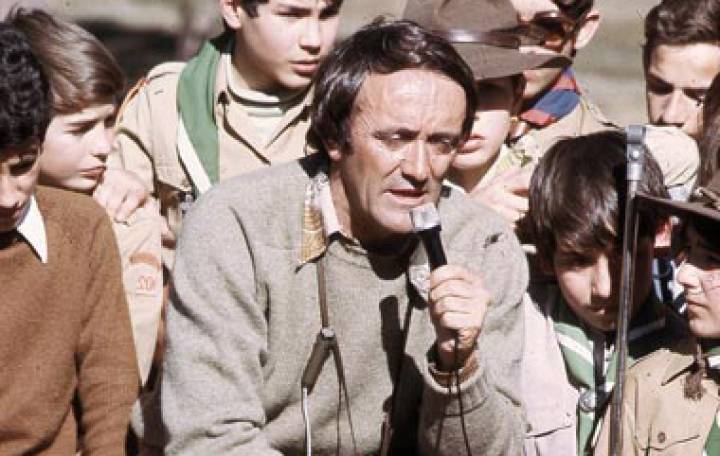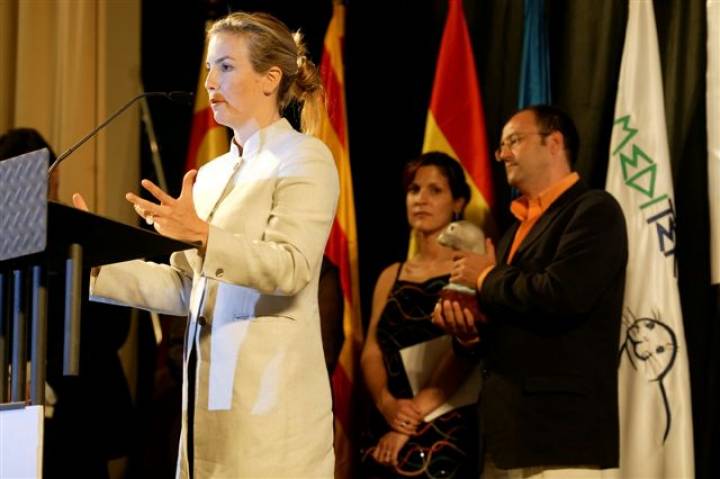- Exclusive interview with the president of the RODRIGUEZ de la FUENTE Fundation
- 14/11/2010
-

- Share
- Tweet
-
Your father, Félix Rodríguez de la Fuente, was one of the most important exponents of Spanish wildlife, up until now. His work extends over 600 TV documentaries, 270 radio programs and 20 publications. Do you believe that the health of wild environments in Spain, would have been poorer had Felix not existed?
Without a doubt, I believe that the level of biodiversity in Spain and its protection, as well as the level of public awareness would be very different. My father began his work in a Spain that at the time exercised a ‘program of extermination of dangerous animals’ in which all local authorities paid a reward to anyone who would bring them the remains of a predator. The 60’s and 70’s are characterized as having been an era of massive, but short sighted, development in which nature was appreciated purely for the economic benefits which its intensive exploitation could bring. It was against that background that my father made his voice be heard, and it was not only responsible for the changes in the law guaranteeing the protection of species of predators, such as birds of prey and the wolf – which he transformed into a cine-genic species – but he also actively fought for the preservation of natural habitats which are national parks today, like: Las Tablas de Daimiel, Doñana and the Cabrera national parks. But out of all the work which my father did, I think the most important was the huge efforts he made to educate public awareness through the media. His magnetism and charisma made his encyclopedias sell millions of copies throughout the world, with his TV series having the highest viewing figures during the years they were aired. The Spanish public was grateful of my father’s nature-awareness campaign which thanks to him changed the conscience of this country. The work which he developed with children and young people is perhaps the most impressive since many of those children are today leading scientists, activists or disseminators. Felix’s track was huge, and his work awakened thousands of vocations and a renewed respect for nature.
The 14th March of this year marked 30 years since Felix’s death, while filming in Alaska aboard a light aircraft. His programs reached every corner of the world with productions at a par with series such as “The man and the Earth” for the Spanish Television. In that sense Felix was to Spain what Jacques Cousteau was to France or David Attenborough is to Britain. Do you think that your father, alongside those emblematic characters, have common traits which led them to attain similar places in their respective countries?
There may well be circumstances common to all of them since all three developed their work during the same era. The arrival of television has a lot to do with the start of an era of greater ecological awareness. They were the voice of nature utilizing every medium of communication at a time in history when man re-asseses his relationship with nature, which up until that point had been perceived as an inexhaustible fountain of resources.
The objective of the Félix Rodriguez de la Fuente Foundation is to safeguard Felix’s work, life and legacy, encouraging projects which promote the harmony between “man and the earth”. We all know that man is drastically interfering with nature. Can harmony be found considering the condition that the planet is in? Do you think that we are still in time to remedy the situation?
If I didn’t think so I would not dedicate my life to the work I do today. I am convinced that even in the most extreme situation which we could imagine, human beings will always have the opportunity to recover a profound sense of harmony withy the environment which sustains him. The problem is that the longer we take to react, the greater will be the price that we will have to pay to as a species. I have always said that it is fundamental that we recognize that the greatest damage we do to the planet we are doing to ourselves as a species. The history of life on earth proves that the planet has survived mass extinctions, but it is probable that humanity will not be able to cope with a drastic change in climate such as the one we are experiencing now, and less so if we are eroding the earth’s living system’s capacity to absorb this type of change. Biodiversity is the best formula which ‘life’ has come up with to maximize its potential to adapt to changes and we are destroying it. It is important that we begin to recognize that the health of the planet is a reflection of human health. All the ill suffered by the Earth will be multiplied a thousand fold as far as our species is concerned.
Odile, you studied in the USA as a biologist and began your professional work at National Geographic Television, involved in development and production between 1996 and 1999. What are your memories of that time, and what was the most important lesson that you learned at such a prestigious place?
I have fond memories of that time. It was a unique opportunity to learn from the best about the truth behind the making of Natural History Documentaries. Budgets, proposals, co-productions, research, etc... I had the opportunity to experience fascinating projects at first hand and to meet wonderful people. I believe that the most important lesson was that, if you have good documentary ideas about a subject matter that you are passionate about, you have the ingredients necessary to go far in this business.



